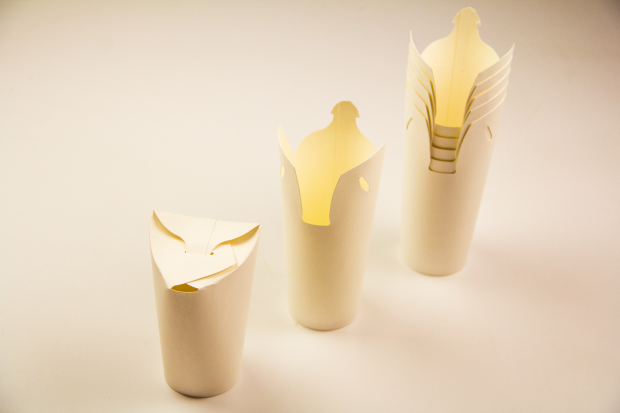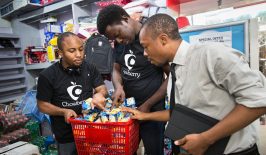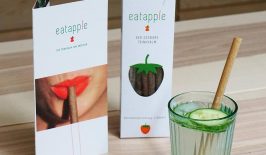Most disposable coffee cups contain a lot of plastic and are a challenge to recycle. TrioCup’s design uses origami to replace all those plastic lids with cleverly-folded, recyclable card.
Ordering a takeaway coffee may be practical and save you some time, but that drink we grab on the go has a pretty nasty aftertaste – the fact only a few minutes later, all of its packaging ends up in the bin. It’s estimated that 2.5 billion coffee cups are thrown away in the UK alone every year – meaning a plastic lid and a paper cup that’s also coated with a thin layer of plastic to prevent leakage.
Let’s add some extra statistics: about 22,000 tons of crude oil are consumed annually to produce plastic coatings and covers, causing around 83,000 tonnes of CO2 emissions per year. And of course, aside from the raw materials used, there is also a much more visible waste problem. The coated cups and their associated lids are very hard to recycle, so they usually end up in the trash without even being separated.

It’s this waste problem that the startup TrioCup has set out to tackle. The team, lead by Hong Kong engineering student Tom Chan, has designed a completely-compostable paper cup that never requires a separate lid. The cup is sealed with an origami-style folding technique instead, meaning no plastic is used to produce it, which also allows it to be recycled more easily. The design won the New Plastics Economy Innovation Prize at 2017’s Circular Design Challenge, organized by OpenIDEO and the Ellen MacArthur Foundation.
Since then the design has gone into production and is currently being tested in some cafes in New York.
While this cup is a winner on the design stakes and could truly help reduce the plastic waste caused by all those takeaway coffees, the best way to cut down on waste is to avoid it from the very start by using reusable solutions. Producing paper cups and throwing them away wastes precious raw materials and energy. So the best option is still to carry your own mug, and enjoy the discounts that many cafes offer you for bringing your own, or alternatively, to get involved in a cup sharing system, such as RECUP .
This is a translation by Ana Galán of an original article that first appeared on RESET’s German-language site.








